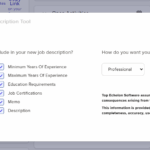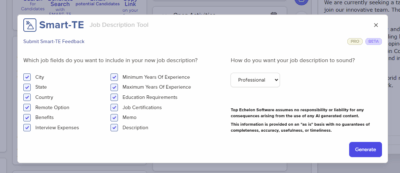In the era of digital transformation, remote work and virtual teams have become integral to the modern workforce. The COVID-19 pandemic accelerated this shift, forcing companies to adopt remote work models quickly. As a result, professional recruiters and search consultants are increasingly tasked with identifying and placing candidates for roles in virtual teams.
While virtual teams offer numerous advantages such as increased flexibility and access to global talent, they also present a unique set of challenges.
In this blog post from Top Echelon, we will explore the challenges associated with managing virtual teams for clients and provide possible solutions that professional recruiters and search consultants can implement to overcome these obstacles effectively.
Challenges of Managing Virtual Teams
1. Communication and Collaboration Barriers
Challenge: Virtual teams often struggle with effective communication and collaboration, leading to misunderstandings and reduced productivity. Differences in time zones, languages, and communication tools can further complicate matters.
Solution: Professional recruiters and search consultants can advise clients to establish clear communication protocols, use collaboration tools, schedule regular team meetings, and encourage open and transparent communication to bridge the gap.
Expanding on this, recruiters should encourage clients to adopt a unified communication platform that integrates messaging, video conferencing, and project management. Regular check-ins and virtual stand-up meetings can help maintain a consistent flow of information. Additionally, creating a shared knowledge base or intranet where team members can access important documents and updates can mitigate the risk of miscommunication.
2. Building Trust
Challenge: Building trust among team members who may never meet in person is a significant challenge. Trust is crucial for collaboration, and its absence can lead to micromanagement and reduced team cohesion.
Solution: Recruiters can look for candidates with strong communication skills and the ability to build trust remotely. Encourage clients to foster a culture of trust by setting clear expectations, offering recognition, and promoting autonomy among team members.
To further elaborate, trust-building activities such as virtual team-building exercises, icebreaker sessions, and collaborative projects can help create a sense of camaraderie. Providing team members with opportunities to share personal interests and hobbies can also foster connections beyond work-related tasks. Recognizing and celebrating achievements, no matter how small, can reinforce a positive and trusting team environment.
3. Employee Engagement and Motivation
Challenge: Maintaining high levels of employee engagement and motivation in virtual teams can be challenging. Employees may feel isolated, leading to burnout or decreased performance.
Solution: Recommend clients to implement employee engagement strategies such as virtual team-building activities, recognition programs, and regular check-ins. Encourage the use of performance metrics and goals to keep employees motivated and accountable.
Expanding on this, clients should consider implementing virtual wellness programs that promote physical and mental health. Regularly scheduled virtual social events, such as online happy hours or game nights, can help maintain a sense of community. Providing professional development opportunities, such as online courses and webinars, can also keep employees engaged and motivated to grow within the organization.
4. Time Zone Differences
Challenge: Managing teams across different time zones can be tricky, as it may result in delayed responses, missed deadlines, and difficulties in scheduling meetings.
Solution:
Suggest flexible work hours or overlapping shifts to accommodate multiple time zones. Utilize time zone tracking tools and ensure that all team members are aware of each other’s availability.
To further expand, clients should create a shared calendar that displays the time zones and working hours of all team members. Scheduling tools like Doodle or World Time Buddy can help find mutually convenient meeting times. Additionally, implementing asynchronous communication methods, where team members can contribute at their convenience, can reduce the pressure of real-time interactions.
5. Technology Challenges
Challenge: Technical issues, such as poor internet connectivity or software problems, can disrupt virtual team workflows and hinder productivity.
Solution: Advise clients to provide reliable technology and offer technical support. Encourage the use of standardized software and ensure team members are proficient in using them. Backup solutions and contingency plans should be in place for technical failures.
Expanding on this, clients should consider conducting regular technology audits to ensure all team members have the necessary tools and infrastructure to work efficiently. Providing training sessions on the use of collaboration tools and cybersecurity practices can enhance team members’ proficiency and security awareness. Establishing a dedicated IT support team that can quickly address technical issues will minimize disruptions.
6. Team Isolation
Challenge: Team members in virtual settings may feel isolated, leading to feelings of loneliness, disengagement, and a lack of connection with colleagues.
Solution: Suggest regular video conferencing, virtual coffee breaks, and team-building exercises to foster a sense of community. Encourage clients to create online forums or chat groups where employees can socialize and discuss non-work-related topics.
To further elaborate, clients can create virtual water cooler channels where team members can engage in casual conversations. Organizing virtual team challenges or interest-based groups, such as book clubs or fitness challenges, can help team members bond over shared interests. Offering mentorship programs where experienced team members support newcomers can also foster a sense of belonging.
7. Accountability and Performance Measurement
Challenge: Tracking performance and holding team members accountable can be challenging in virtual teams, where direct supervision is limited.
Solution: Recommend clients to establish clear performance metrics and KPIs, conduct regular performance reviews, and utilize project management tools to monitor progress. Encourage a results-oriented approach that focuses on outcomes rather than micromanagement.
Expanding on this, clients should implement transparent goal-setting frameworks like OKRs (Objectives and Key Results) to align individual contributions with organizational goals. Regularly scheduled one-on-one meetings between managers and team members can provide opportunities for feedback and performance discussions. Utilizing project management tools like Trello or Asana can help track progress and ensure accountability.
8. Cultural Differences
Challenge: Virtual teams often comprise members from diverse cultural backgrounds, which can lead to misinterpretations and conflicts.
Solution: Advise clients to promote cultural sensitivity and offer cross-cultural training. Encourage open discussions about cultural differences and establish norms for respectful communication.
To further expand, clients should consider organizing cultural awareness workshops and training sessions that highlight the importance of diversity and inclusion. Encouraging team members to share their cultural traditions and celebrations can foster mutual understanding and respect. Creating a diversity and inclusion task force can also help address cultural issues and promote a harmonious work environment.
9. Onboarding and Integration
Challenge: Integrating new hires into virtual teams can be challenging, as they may struggle to adapt to the remote work environment and company culture.
Solution: Recommend clients to develop a robust virtual onboarding process that includes training, mentorship, and opportunities for new hires to connect with their team members. Regular check-ins with new employees can help address any issues promptly.
Expanding on this, clients should create a comprehensive virtual onboarding plan that covers the first 90 days of a new hire’s journey. This plan should include detailed training modules, virtual tours of the company, and introductions to key team members. Assigning a buddy or mentor to new hires can provide them with ongoing support and guidance as they navigate their new roles.
10. Security and Data Privacy
Challenge: Virtual teams often deal with sensitive information, making security and data privacy a top concern.
Solution: Ensure clients implement strict security measures, including encryption, secure access controls, and regular cybersecurity training for team members. Compliance with data privacy regulations should be a priority.
To further elaborate, clients should conduct regular security audits to identify vulnerabilities and implement necessary safeguards. Providing team members with secure VPN access and multifactor authentication can enhance data security. Regularly updating software and systems to protect against cyber threats is also essential. Educating team members on phishing attacks and other common cyber threats can help mitigate risks.
Solutions for Professional Recruiters and Search Consultants
1. Understand Client Needs
Start by thoroughly understanding the specific needs and expectations of the client regarding their virtual teams. Tailor your recruitment efforts to find candidates who align with these requirements.
Expanding on this, recruiters should conduct detailed consultations with clients to understand their organizational culture, team dynamics, and specific challenges related to virtual work. This information will guide the recruitment process and ensure that candidates are a good fit for the client’s unique needs.
2. Source Candidates with Virtual Work Experience
Look for candidates with prior experience in virtual or remote work settings. These individuals are likely to be more adaptable and accustomed to the challenges of virtual teams.
Expanding on this, recruiters should leverage online platforms and job boards that specialize in remote work opportunities. Participating in virtual job fairs and networking events can also help identify candidates with relevant experience. Highlighting remote work experience in job postings can attract candidates who are well-versed in virtual team dynamics.
3. Assess Soft Skills
Prioritize soft skills during candidate assessments. Look for candidates who possess strong communication skills, adaptability, self-motivation, and the ability to work independently.
Expanding on this, recruiters should use behavioral interview techniques to assess candidates’ soft skills. Scenario-based questions can provide insights into how candidates handle remote work challenges. Personality assessments and psychometric tests can also help identify candidates with the right traits for virtual team success.
4. Offer Training and Resources
Recommend clients to invest in training programs for virtual team members. This can include communication workshops, time management training, and technical skill development.
Expanding on this, clients should consider offering continuous learning opportunities through online courses, webinars, and virtual workshops. Providing access to a library of resources, such as e-books and industry publications, can support ongoing professional development. Encouraging team members to pursue certifications in remote work best practices can enhance their skills and productivity.
5. Create a Talent Pipeline
Build a talent pipeline of candidates who are well-suited for virtual team environments. This allows for quicker placements when clients have immediate hiring needs.
Expanding on this, recruiters should maintain a database of pre-screened candidates with remote work experience and strong soft skills. Regularly updating this database with new candidates and maintaining relationships with potential hires can ensure a steady supply of talent. Engaging with candidates through newsletters and virtual networking events can keep them interested and informed about upcoming opportunities.
6. Promote Remote Work Best Practices
Share best practices with clients, such as creating clear work-from-home policies, setting boundaries between work and personal life, and promoting a healthy work-life balance.
Expanding on this, recruiters can provide clients with resources and templates for developing remote work policies. Offering workshops on work-life balance, time management, and productivity can help clients and their teams navigate the challenges of remote work. Encouraging clients to implement regular wellness check-ins and virtual wellness programs can support employee well-being.
7. Emphasize Communication Skills
Encourage clients to prioritize candidates with excellent written and verbal communication skills, as effective communication is the cornerstone of successful virtual team collaboration.
Expanding on this, recruiters should use assessments and practical exercises to evaluate candidates’ communication skills during the hiring process. Providing clients with guidelines for conducting effective virtual meetings and fostering open communication can enhance team collaboration. Encouraging the use of communication tools that support real-time and asynchronous communication can also improve team interactions.
8. Provide Insights on Cultural Fit
Share insights on how candidates’ cultural backgrounds may align with or differ from the client’s organizational culture. This can help prevent cultural clashes within virtual teams.
Expanding on this, recruiters should conduct cultural fit assessments to evaluate how well candidates’ values and work styles align with the client’s culture. Providing clients with strategies for fostering an inclusive and diverse virtual team environment can enhance team cohesion. Encouraging open discussions about cultural differences and promoting cultural sensitivity training can prevent misunderstandings and conflicts.
9. Advise on Technology Selection
Guide clients in selecting the most suitable technology stack for their virtual teams, taking into consideration their specific needs and budget constraints.
Expanding on this, recruiters should stay informed about the latest tools and technologies that support virtual work. Providing clients with recommendations for project management, communication, and collaboration tools can enhance team productivity. Offering training and support for the implementation of new technologies can ensure a smooth transition and adoption.
10. Facilitate Onboarding
Assist clients in developing a comprehensive virtual onboarding process that includes training, introductions to team members, and access to necessary resources.
Expanding on this, recruiters should create a detailed onboarding checklist that covers all aspects of the virtual onboarding process. Providing clients with templates and resources for virtual onboarding can streamline the process. Encouraging clients to schedule regular check-ins with new hires during the initial months can help address any challenges and ensure a smooth integration into the team.
11. Monitor and Support
Offer ongoing support to both clients and placed candidates. Regularly check in with candidates to ensure their integration into the virtual team is proceeding smoothly.
Expanding on this, recruiters should establish a structured follow-up process to monitor the progress of placed candidates. Providing clients with feedback from candidates can help identify areas for improvement in virtual team management. Offering additional training and resources as needed can support the long-term success of placed candidates.
12. Stay Informed
Stay up-to-date with the latest trends and tools in remote work and virtual team management to provide clients with the most relevant advice and strategies.
Expanding on this, recruiters should participate in industry conferences, webinars, and online forums to stay informed about the latest developments in virtual work. Subscribing to industry publications and newsletters can provide valuable insights and updates. Sharing knowledge and best practices with clients can enhance their virtual team management strategies and ensure ongoing success.
Managing Virtual Teams: Here to Stay
The challenges associated with managing virtual teams are real, but they can be successfully navigated with the right strategies and solutions. As professional recruiters and search consultants, your role is crucial in helping clients find and place candidates who are well-prepared for the virtual work environment.
By understanding the unique needs of virtual teams, sourcing the right talent, and offering guidance on best practices, you can assist your clients in building productive, cohesive, and successful virtual teams. With the continued growth of remote work, your expertise in addressing these challenges will be increasingly valuable in the ever-evolving job market.
By leveraging their expertise and resources, recruiters can help organizations achieve their sustainability and CSR goals, ultimately contributing to a better world for all.









